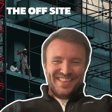Become a Creator today!Start creating today - Share your story with the world!
Start for free
00:00:00
00:00:01

Did Procore Take Critical Secrets? Oracle’s Bold Accusations Explained
This week on the Off Site Podcast, Carlos returns from holiday to join Jason in tackling three pretty sizeable topics:
1. Oracle's lawsuit alleging an ex-employee gave trade secrets to Procore when joining them.
2. Ex-Autodesk CEO Amar Hanspal's 12 lesson for developing products from his recent appearance on the Bricks And Bytes podcast.
3. FM Conway's acquisition by Vinci and whether this continued conglomeration of contractors is a good thing.
Check out the article from Bricks And Bytes here. OR Listen to the episode here.
Follow Carlos on Linkedin | Follow Jason on Linkedin | Check out Aphex
Transcript
Oracle's Legal Battle with Procore
00:00:00
Speaker
According to Oracle, a former senior employee ah ah took with him thousands of confidential documents, source code, project plans, customer data from his Oracle device, downloaded it, took it, and then joined Procore to build a rival product to the thing that he was working on over at Oracle. So to build a direct competitor. Surprisingly, Oracle wasn't too happy.
00:00:29
Speaker
What do you reckon? Pretty cut and dry? It's good. The evidence doesn't look too good. um thousands not yeah and Not legal, if it not a lawyer, but it doesn't look too good. so yeah
00:00:57
Speaker
Welcome back to the off-site podcast joined once again after a couple of weeks away by Cue the Music, Olu. Co-host, Carlos Caballo, mate. How are you? Welcome back.
00:01:12
Speaker
Thank you very much. It's good to be back. Um, it feels like a long while since the last one. But, um, yeah, how was it with Sam last week? It was Sam. Wasn't it? up Yeah, he's arts. We should just, we should, you or I should go away more often. He's actually just ride his coattails on the content. I left two engineers on unsupervised though. So, you know, who knows, but, uh, yeah, probably stuff we actually got stuff actually got done.
00:01:40
Speaker
It's like a Saturday on site where no one's there. You can actually do all the you can do all the stuff that you're not supposed to do on the other days. You mean your QS is read on site on a Saturday?
00:01:51
Speaker
it's I'll give you a tip, mate. It's not the QS's we're worried about.
00:01:58
Speaker
Uh, very good. It's the, it's the client, the safety team, the, you know, this is quite an old school. I'll get in trouble for saying this, but yeah, stuff got done. Things magically happen on Saturdays. People on construction projects, things magically happen on Saturdays.
00:02:14
Speaker
A lot of things happen when there's a set of eyes. Or night shift. How did that pole get installed? Don't worry, it happened last night. It's there. Very good. And so you were traveling around the world. You were in South Africa.
00:02:31
Speaker
Yeah, I ah saw Pretoria, Johannesburg and Cape Town. um It was a family wedding. um A wedding of two quantity surveyors. So obviously it was a massive party. I can't wait for the years long dispute working out who's paying for what. Yeah, luckily I was a part of that discussion. But no, it was really good.
00:02:54
Speaker
Welcome back. That's great. And you ah you came back to to the news you were hoping for.
Impact of Politics on US Market: Trump's Policies
00:03:00
Speaker
The end of the world. Yeah, um I don't think we should go too deep onto the gloomy of ah ah the new US president. But I do think one thing I couldn't help but think about might form the basis of a topic in the future is war building. um But yeah,
00:03:23
Speaker
yeah that's a big contract. Trump's very pro-American industry, pro ah-using like onshore companies. So it'll be interesting to see if you look at the obviously this split of like American versus European and other contractors operating in the US. Is it going to be harder for them to win large bids? Is he going to be pro-American companies delivering major schemes, putting more money back into U.S. sort of industry. So it'd be interesting to see if he makes any changes on foreign companies bidding on jobs. Do you reckon do reckon they care?
00:04:01
Speaker
um like ah because it's not I guess one perspective you could have is just like it's a service. Construction is a service provider. It's we come in and build the thing. Is there any risk of not developing intellectual property? It's like quite heavy to start the episode with, by the way. but um This isn't the topic. This is the heaviest pre-topic we've ever had. Yeah, it's also a topic I'd like to think about for a few minutes before. right Let's we come how put a pin in it and we'll come back to it. yeah okay yeah um So we've got a surprise with other topics on the agenda this week. So we're going to kick off with actually what is a super interesting discussion with two contact giants going head to head in a legal battle.
00:04:47
Speaker
ah We're going to dive into the news of Oracle suing Procore for the alleged theft of insider trade secrets. Next, following that, we're going to go over some interesting points that we heard on a podcast recently from ex Autodesk CEO about the right way to develop products for construction and engineering. And then finally, we are going to dive into UK contractor F and Conway, another um local family-owned contractor being bought by a large multinational construction conglomerate in Vinci and whether that is good for the industry. Off the bat ah Oracle suing Procore so they filed a lawsuit against Procore alleging a oh alleging case of trade secrets theft and breach of contract so
00:05:40
Speaker
According to Oracle, a former senior employee ah took with him thousands of confidential documents, source code, project plans, customer data from his Oracle device, downloaded it, took it, and then joined Procore to build a rival product to the thing that he was working on over at Oracle. So to build a direct competitor. Surprisingly, Oracle wasn't too happy.
00:06:09
Speaker
What do you reckon? Pretty cut and dry? The evidence doesn't look too good. um Thousands of documents. Not legal, if it not a lawyer, but it doesn't look too good. so yeah and And it looks like ah they can prove that These materials have been directly transferred onto a protocol issue laptop. Yeah. So that's not that's interesting. Yeah. Yeah. Also, I checked out the guy's LinkedIn. he He went straight from one to the other and he was clearly working on that product. So I'm surprised there wasn't any. So yeah I don't know if a waiver was signed and if that like one of those waivers actually looked like is
00:06:58
Speaker
This could be a lot deeper than what the article suggests, which is you stole some stuff. This could have had some more sort of legs to it. The good news is, ah as like a positive for Pro Court, if it is true, they definitely didn't try and cover it up.
00:07:15
Speaker
because the guy directly came from the competing product ah has ah literally by the looks of it, like, I don't know how they can prove it, but yeah, it looks like they downloaded all this kind of information and then literally it's on the protocol device. Then they build a direct competitor. Yeah, I think it shows that they like stored them into like, he uploaded them into his personal like Google, you know, Dropbox or Google, um Google Drive account.
00:07:45
Speaker
Yeah, does it definitely doesn't look good and it doesn't look like there's any coverup. And I wonder, you know, is it like a leave this per you know is it is it like leave this person out to dry and blame this person or is it like a, yeah, how much is it the individual or the company?
00:08:04
Speaker
And to elaborate slightly on the um the information that was taken, it's not just like playbooks and like stuff that like a lot of people would want to take because it's used like it's a bit more sort of accepted and useful. It's actual source code and things like that. So there was... So so just to to give some background on it for those that know the product suite, so Oracle, which is a very large ah software company out of the US, has a ah relatively large AEC division, so the construction and engineering division.
00:08:40
Speaker
They own things like Primavera P6. They have a product called Textura, which is kind of like an yeah ERP payments product, which is what marked the employee in question was leading. He was an executive vice president or a VP in Oracle.
00:08:58
Speaker
Procore had been trying to build a competitive product for some time. And ah this is a bit, I don't know, articles are saying it was going slow, struggling, whatever, came across and they built out this product, which eventually became Procore Pay, which is ah like literally direct competitor to the the Oracle product.
00:09:19
Speaker
And then in terms of ah where we are, obviously they're going to court. Our program refused any access to the device in terms of forensic inspection.
Oracle's Legal History and Industry Implications
00:09:32
Speaker
So you'd assume that's the default thing that your lawyers would tell you anyway, but that also doesn't look too good. But Oracle are no stranger to a court. In the last 15 years, they've been a bunch of times against companies like SAP, Google um and a couple of smaller companies.
00:09:53
Speaker
um And they tend to win. There's only one or two examples of them not winning. What's the saying? If you can't beat them, sue them. I don't think that's the saying. I just made that up. I thought I heard that one. I think it's join them, right? Sue them. Maybe. Yeah. But one thing anyway, I started to think about, because it's early doors, we can obviously speculate on some limited information as to what might happen.
00:10:20
Speaker
In the f event that Oracle are successful, I just did a little bit of research into like what the outcomes could be other than like some sort of financial settlement. They could have the courts effectively remove the product from the market. So that'd be a big loss um for protocol if that happens. I don't think it would, but yeah.
00:10:43
Speaker
Yeah, i I couldn't then find an example of that happening. It seems to be settlements. Because at the end of the day, they'll probably still argue that it's only like a tiny bit similar rather than a complete like for like copy. So um yeah, it looks like a settlement would be the most likely outcome.
00:11:02
Speaker
The case that this ah this reminded me of when i was reading it was a number of years ago there was a really high high profile case involving Waymo which is a subsidiary of Google um which accused a ah which accused Uber of basically doing almost the same thing. So there was this employee called Anthony Lewandowski that left Google and Waymo, allegedly took thousands of these confidential documents, source code, et cetera, started his own self-driving car startup ah called Auto, which was
00:11:40
Speaker
Nice, my son's name. um And then very quickly, Uber bought the auto company for like $600 million dollars or something crazy, ah clearly to get the IP from Google. And in that case, Waymo won the case, and Uber had to pay Waymo the equivalent of about $250 million dollars in stock.
00:12:07
Speaker
I hope they kept the stock. yeah yeah
00:12:13
Speaker
<unk> nice yeah v for that yeah yeah um So you'd you'd imagine there's some sort of calculated, if it is proven to be true at whatever level, there's probably some form of either royalty-based conversation or some like ah ah calculated penalty based on market share that it might have took and what took or how much it impacted their ability to go to market. Yeah, there was another one, ah again outside of construction, but a company called Zunum Aero, they alleged that Boeing used their trade secrets to develop some sort of hybrid ah aircraft.
00:12:53
Speaker
So like in ah in in reverse, so these other two are like the big companies suing the smaller company, but this is like in reverse. Yeah. And they they actually won. um So they settled at like 80 million, but then it got overturned later because um they failed to prove that the trade secrets were actually legally protected. So then you ain't getting a whole legal bubble of, yeah.
00:13:18
Speaker
There'll be some people reading some contracts and insurance policies and everything right now. Yeah. That'll be one boring room until the settlement. But yeah, I guess watch this space, right? Yeah, absolutely.
00:13:36
Speaker
diving on. So, um ah recently the Bricks and Bite podcast, which as a shorter side, if you don't already subscribe or listen to it, I ah highly recommend it. The guys running it are putting an incredible amount of effort into creating a a whole a plethora of really interesting content around construction, construction technology, and getting really high quality guests onto the podcast. So great work to to the guys.
Insights on Construction Technology with Amar Hansbal
00:14:09
Speaker
Anyway, um they recently had a conversation with the ex-CEO of Autodesk, Amar Hansbal.
00:14:18
Speaker
And ah he was talking about these 12 lessons that he had laid out um recently about how to make products in construction technology um well, i guess yeah as opposed to, I guess, the generic lessons of how to build product in other industries. So I guess what's unique to not just construction, it was AEC, which includes the design and architecture space.
00:14:45
Speaker
I thought they were interesting when I was listening to them. I went away and read them after the um after the episode. I think we'll put the ah we'll put the link in the show notes to the actual blog post. There are a couple that jumped out to me if you want to want to dive through a couple of them. Carlos, you want to go first or me?
00:15:04
Speaker
Yeah, happy to go. I think a couple stood out. The first, ah so I was thinking about two of them in together, actually. So there was one sort of referred to as the long game. um And like, it takes seven to 10 years really, to establish yourself within the the AC market. And the other was depth before breadth. And those two are starting to think about together.
00:15:24
Speaker
A lot of startups immediately try and search for like a silver bullet or this viral marketing campaign that and just allows you to go from zero to a hundred in in months or even like one or two years. um And I think we know more than most like how much time and work you have to sort of take to understand the customer, iterate the products to get product market fit because there's so many personas and sort of cogs in the works and it's it's not a quick and easy win.
00:15:49
Speaker
And there's always I always have that big red flag moment when I see a startup that's relatively small announcing that they've got like five major projects, but they're in five different countries and they're on four continents. But really, it's it's quite a shallow deployment. So, yeah, I think um A lot of that will be driven by VCs wanting growth really quickly. And everyone's trying to raise cash. They need this image that they're massive. But I think the depth before breadth is a massive thing. um And it was a very sort of sensible view. This wasn't like a over the top. So so maybe maybe to maybe to give some context on on the on the two that you're talking about. So the the first in these, I guess, lessons or rules is this idea of the long game, where ah
00:16:34
Speaker
The adoption cycles are uniquely, they're unique and often it's uniquely slow compared to other ah industries where you've got the the dynamic of project-based procurement and project-based cycles. um And you've got often ah industries and projects which are in a a very high risk, low margin environment, especially on the construction side.
00:17:00
Speaker
And so the propensity and the availability of people's time, energy and money to test a whole bunch of things that may or may not work, are exceptionally low. And ah the industry is naturally exceptionally referential um in terms of ah deciding what things to adopt and not to adopt, more likely to listen to their colleague on ah another project, then a million ads that you might throw at them, or a million podcasts you might go on and say how good you are, how much money you've raised. um And so the long game idea is that if you are going to try and build something in this industry, you better be prepared to do the seven to 10 year slog of continual effort and grinding that you have to constantly be searching to improve. And he uses the idea of finding the source of the Nile.
00:17:50
Speaker
And it is a constant iteration of improvement of delivering, well, as we say internally, delivering value. And yeah you can you can stack on top of that. And I quite like the saying you had, which was, expect the punch. Because in that slug, not just as founders, but as a company, you're going to hit so many setbacks and obstacles. And it is going to be like, it's hard graft, right? You can have loads of knockbacks. So it sounds obvious, but it is the reality. But going into it, expecting it, you're going to be punched. So you're at ease with that. And that, yeah, just hurdles that you get over rather than, yeah, getting fairly knocked down and putting it in the too difficult bucket, too early.
00:18:29
Speaker
Yeah, a good half of the lessons are basically expect this to take a long time. Expect you to have to grind at it for the long time. Why you shouldn't invest in technology and construction.
00:18:44
Speaker
and Don't run out of money. That's like half of the lessons, um yeah ah which is very true. I think it's interesting what that means for anyone that's like an investor, and we're not investors in ah construction technology, but ah anyone that is an investor, the I guess the typical venture funded pathway is raise money at a certain milestone with the goal of getting to this other milestone and then being able to raise you know the next ah you know level up in the game.
00:19:15
Speaker
And given you've got the burden of, or you've got the reality of these ah possibly sorrow adoption cycles, the need to not run out of money and this other story of like, expect the punch. If you are in the space as a startup, you have to think really carefully be at raising about raising that first check, what you intend to do with it. Because if you are going to get on the raise the first check so I can get to the next check so I can get to the one after.
00:19:44
Speaker
you are kind of going against that set of rules, unless you're very, very, very ah sanguine about what those milestones are, how long they're going to take, and then you execute perfectly. um And everything kind of goes in your favor, but you better expect the punch as well. So I'm just googling sanguine. Sanguine. It's like a, it's a Spanish wine, I think. um but
00:20:10
Speaker
Yeah, it's, um, I learned that one from Greg, by the way, that was, that was, that was a lesson from Greg from, uh, I have to Google every other word that guy says just to keep up.
00:20:22
Speaker
It leads to a really, really punchy conversation. um Yeah, it would be interesting to understand like there are lots of construction-focused VCs. like are there Is their mindset actually on board with this? Because like if you're expecting seven to 10-year returns, are they really in that mindset of raising a pool of cash every year and having that return out 10 years ahead? Because you're going to be raising a lot of money each year to keep it going before you're seeing anything substantial in the future.
00:20:50
Speaker
Yeah, I'd love to see the um i love to see the actual like ah portfolio and the investment book for a like a construction technology VC at some point. because there's this concept in venture capital, this idea of the power law that like some small percentage of your investments are gonna basically be where all the the return is. And so you're basically placing, you're kind of at the roulette table placing bets on numbers, you ah knowing that you're gonna lose most of them and hope one of them or two of them hit. And so that creates a ah slight, well, a slight, quite a large misalignment incentives because you've got,
00:21:30
Speaker
you know, maybe it's one in 10. Let's say just hypothetically, it's one in 10 is the one that you're expecting to to return ah all of the the fund and the investment. Then from the venture side, you are kind of expecting that nine of them will middle, maybe some of them, like a third of them will fail, though might, you know, break even or something. From the from the company side, you're like all in and you're, you're, you've got one, you know, one chip on the table, which is that company. And so yeah, you can definitely end up in this massive misalignment centers where the company is like, awesome. We've got this investment. They believe in us, but like, they're like, you're one of the chips on the table. And are you the chip that they've already sort of slightly shifted aside? Um, yeah. Um, cause your bank is not top five or whatever. Yeah.
00:22:20
Speaker
Yeah, yeah, yeah. I think it was, I definitely recommend that folks ah that take a look at it will be in the show notes. The podcast as well is very interesting. I should have also noted that Amar, the chap that wrote it, had worked at Autodesk for 27 years and worked his way up to become the CEO.
00:22:44
Speaker
So definitely knows the industry. That's for sure. There wouldn't be that many. There wouldn't be many that had more experience than them. Has he got a full head of hair? Only a person that doesn't have a full head of hair is going to ask that question. I can tell you, you've been wearing a wig for years, right? You could have told, you could have given me 70 questions to ask after that. I don't think, has he got a full head set of hair would have popped in there.
00:23:12
Speaker
Oh, good. It's interesting. Biases. That's a topic. um All right. Final final topic. um Conglomeration of construction. That's another big word. Conglomeration.
Vinci's Strategic Acquisition of FM Conway and Market Impact
00:23:24
Speaker
ah So a week or so ago ah from when we were recording this, there was news that broke that the French construction giant Vinci um is buying a prominent UK construction contractor, FM Conway.
00:23:41
Speaker
This is a another in a kind of string of acquisitions made by large multinational construction or infrastructure companies buying or investing in ah domestic contractors in countries around the world. ah We talked previously about the Hocktief slash Turner acquisition of Dornan as well, the Irish contractor. So I guess, first of all, reflecting on the acquisition of Conway, Carlos being a a UK and London resident where literally you can't walk like two minutes to down the street and not see a Greenway van. yeah yeah And then maybe diving into the actual concept of of you know all this ah um international investment in local contractors.
00:24:26
Speaker
Yeah, so i mean as you say, Conway, you see them everywhere. They're doing something like a half billion revenue, and they only do relatively small contracts, which shows the volume that they're churning out. Vinci, especially with organizations like Taylor Woodrow, which is a subsidiary, um they do a lot in the highway space.
00:24:45
Speaker
um they do have another subsidiary called Uravia that does a lot of surfacing and sort of local highways type projects. So it seems to be a big focus in terms of the highway sector that they want to get into. And it makes a lot of sense to buy one of these local companies, they can have a relationship with every council, they can have a relationship with everyone that they need to to do well within that space. um There's that sort of strategic buy local, absorb that knowledge as a mechanism to grow within that space. um And then also with the big bigger subsidiaries like Taylor Woodrow who win Highways contracts, they can then either become more competitive because they've got effectively sort of in-house or if not, you've got fee on fee, which is still a winner winner for the group if you've got subsidiary subcontracting to a subsidiary beneath.
00:25:37
Speaker
So it seems like a ah sensible purchase if you're you're looking to expand that sector within the country. And FM Conway seem to have like a decent bit of R and&D. they've I saw a couple of articles around like was using recycled materials and doing work in that space. So maybe there's some interesting IP that they're also buying as part of the process that they can use elsewhere. But yeah, it's um it's a well-known brand across the UK.
00:26:05
Speaker
Yeah, I think um and think it's a it's really interesting how prevalent this strategy is and and and specifically how often Vinci as a company does it. I'll give you a quick guess. i As you were talking, then I did ah some quick research, but I couldn't find the latest stats. But let's wind our way back to 2016, so quite a number of years ago. How many subsidiaries do you think Vinci as a company has?
00:26:37
Speaker
They've got loads because even if you go, if you drive through France, there's a Vinci logo on almost anything like huh even like maintaining airports and, and yeah, service station things. Uh, 10 more, maybe at least one a year. ah You're not even close. Uh, so back in 2016, they had about 1900 subsidiaries.
00:26:59
Speaker
1900. 1900. You could be sitting on a chair. So I've been 10 added since 2016 or whatever you said, not total. No, total, total. Right. Oh, sorry. Okay. Either way, I wouldn't have been guessing 1900s.
00:27:16
Speaker
They own, they it the the it'd be interesting to dive into the the model of, you know, they're a conglomerate that owns a lot of infrastructure, they operate a a lot of infrastructure, they own construction contractors, they own speciality, they own like general contractors and specialty contractors.
00:27:34
Speaker
There's obviously some diversification strategy that is underpinning that, but it is amazing how extensive their reach is. I can think even in Australia of like four or five, maybe four or five contractors in Australia and New Zealand that they own at different levels of the supply chain. And I think that exists around a lot of parts of the world. Their reach is is massive.
00:28:01
Speaker
What do you think it means for the for Conway? By the way, I actually should give some context. So FM Conway is a ah family owned UK construction and kind of maintenance civil maintenance type ah contractor. They do a lot of small and road based projects. It was founded by Francis Michael Conway, that's the FM, ah for those who didn't know, back in 1961. Has a turnover of about 500, 600 million pounds a year and has about 2,000 people on the books. So yeah, what do you think that means for for Conway? Like strategically trying to grow it? Is it a then cut cost out? are they you know What do you think? um So you'd expect there will be some cost saving because
00:28:52
Speaker
there will be like head office overhead type costs that you could probably get some efficiencies out of by having a parent company. In theory, that there would be a model to make it more profitable. With those additional resources, could FM Conway win larger contracts and go for more because you need a healthy bank balance for a lot of these capital schemes to even win them or even tender for them?
00:29:15
Speaker
So it might put them into that category of one of the bigger players. i'd I'd imagine as an operator unit, I would bet that they'll leave it largely there with the name and the brand because it is a well-known, well-respected brand. I can't ever remember a piece of negative news about them. um And if they've got that relationship across the board winning contracts, would you risk that by switching it into a vich like ah a Vinci brand in terms of actual name and everything else that comes with it?
00:29:41
Speaker
That doesn't appear to be their model typically. It's typically keep the brand intact and just stick it by Vinci. but they They change the logo. they They normally make the logo a blue version of the old logo. um Keep the name and stick by Vinci underneath is the the typical playbook.
00:29:59
Speaker
Yeah, um but that's there's a huge spend on highway still in the UK. So are they now going to boost like a Taylor Woodrow their ability to win jobs by having like the expertise below in terms of supply chain? Does that improve their ability to win these bids? Is that actually the strategy? I think that's quite interesting because yeah, I think i think i would I would say it's probably unlikely that the goal is to like change where the Conway brand is trying to like win work.
00:30:27
Speaker
you know, it's going to directly compete possibly with either like the Ringway, Urovia, Taylor Woodrow um or Vinci Construction itself or Vinci Garden Project. like it's yeah They've got one at every layer of the the the stack then. um But I could definitely see in a um in a market where maybe getting good subcontractors or good suppliers or whatever is harder that that kind of um guaranteed supply from a recognized brand um could help the the the GC, like the prime contractor ah win work in in that bid. Yeah, for sure. What are your thoughts on the idea of, yeah, like all of these, if you're a country,
00:31:15
Speaker
you're the UK and you've got all of these international contractors buying up your um construction, family owned, locally owned contractors. ah Is it a good thing? Does that mean more investment into the country or is it a is it a you know strategic risk for the country that it doesn't have locally owned and controlled ability to build infrastructure? That's a big question. We do the big questions and then we guess the answers. Yeah.
00:31:48
Speaker
Yeah, so it's an interesting question because like if you look at major schemes here, like most contractors are foreign owned or they're not based in the UK. And that's a good thing, it encourages competition, like it brings in expertise, it makes sure that we have this competitive market. Yes, more and more British firms being bought up by these huge conglomerates and taking the profits back to other organizations. Everyone's going to have a view on that.
00:32:17
Speaker
Yeah, it's whether they protect those firms and protect the jobs. That's the most important thing really. And if one of these firms now go under and it's actually part of a foreign-owned conglomerate, do the government help? I mean, they've they've kind of taken a stance now not to really bail out these companies anyway, but you would expect them to be a bit more resilient being part of a huge organization.
00:32:38
Speaker
if they have bad years and bad contracts. So I think that's a good thing. um And if they can grow their businesses, you take the jobs and everyone being able to work on these schemes over like profit staying on our shores or however people want to sort of um name that as. So yeah, I think it's a good thing. It's yeahs it's stability and longevity, I guess.
00:33:04
Speaker
At the top end of the project size, so at the very large projects, there is the, as you kind of alluded to, there's this, um the need as you get very large projects to have certain finite meet certain financial requirements in order to be able to bid and deliver those projects. And so often the playbook is the big ah infrastructure construction conglomerate like a a Vinci can buy a local a substitute that wouldn't have been able to bid for a job and give them the financial wherewithal and the expertise to bid on those projects. Which seems like a logical set of behaviours and as the country that kind of um gives you more competition for the project which should get you a lower price.
00:33:48
Speaker
Do you think it's, um this I'm going to follow up with one last big question before we wrap. um Do you think that like is ah contrary to, do you think that the the country and the delivery authority would be better served by making the project smaller?
00:34:03
Speaker
so that the local contractor could bid for it without um having to be bought. like Are we getting lazy and just packaging projects up into massive mega projects because we couldn't be bothered to do the individual procurement and design beforehand? That's an even bigger question, the last one you asked.
00:34:20
Speaker
um ah You can just imagine immediately if you slice these massive schemes into more and more, you've got claims, you've got overheads, all of that world gets horrible. That's what's happening though because all you're doing is just sticking, you're just sticking a subsidiary of Vinci in the middle and they're slicing it and doing the claims and so it's happening somewhere.
00:34:41
Speaker
But to combine two of my claims, to make one big claim, if if FM Conway do have, I mentioned maybe they've got like some techniques or ah materials that is ah sort of new and efficient and things like that. Let's just say they have a superior product.
00:34:59
Speaker
um And now they have the bank balance behind them to tend it for anything. Could they start going to their national highways with like framework contracts to do very large scale stuff across all of their tier one that contracts of work? So you could really start bidding for what is in theory billions of pounds spread across lots of schemes with a product that is superior. It kind of gives them that boost to be get to be able to go and do that if they have a superior product. say I think they could win very big contracts with the client organizations to work within frameworks. I'd be surprised if we see an FM Conway moving into this sort of main contractor space. Tarmac sort of tried that a few years back, and I think they've reverted back to to what they do best, especially as Taylor Woodrobe is kind of a highways business within but any way. So would you try and compete? Yeah. you've You've definitely Donald Trump. That was nothing to do with the question that I asked, but it was very interesting.
00:35:57
Speaker
You are welcome. um Wonderful. Well, we are definitely, we're definitely at time. So and it's lovely to have you back. And why don't you read us out, mate? Thank you very much. And thank you very much, everyone, for tuning into today's show. If you did enjoy today's episode, please do think about liking the video or following us on your chosen podcast platform. We really do appreciate your support and we'll catch you all next week. Bye bye.
00:36:53
Speaker
Thank you.



















